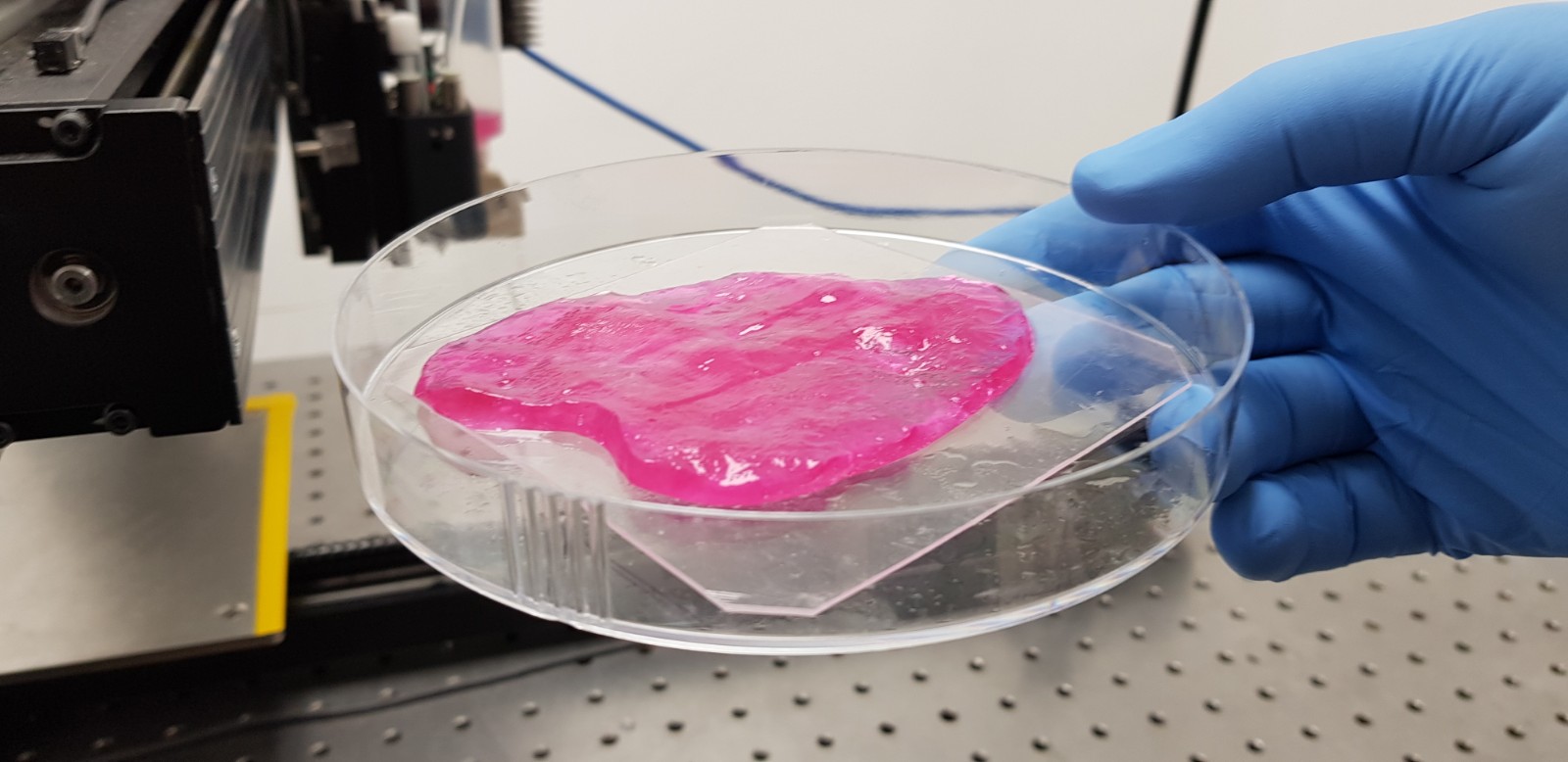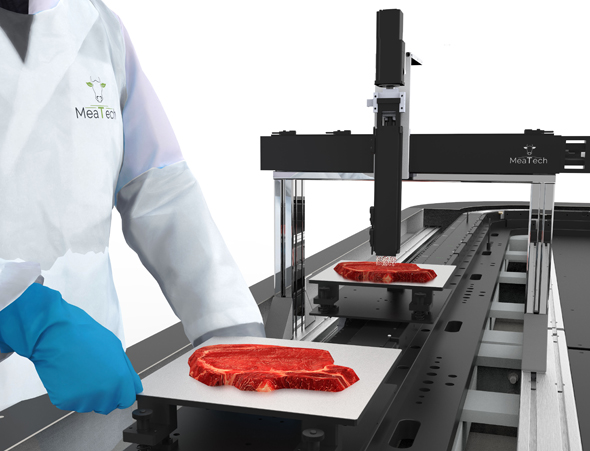MeaTech3d is a startup based in Israel with a goal of producing the first lab-grown steak. Their process involves the use of 3D bio-printing and inhouse produced bio-ink, the end product being similar in texture and taste as traditional meat products. The founder of MeaTech3d is Sharon Fima who was also the founder and CTO of Nano Dimension, developing a complete desk-top 3D printing system for multilayer PCB’s.
MeaTech3d has gained considerable attention over the past couple of years, adding significant investors such as Rami Levy of Rami Levy Hashikma Marketing and Steve Lavin of OSI Group. Rami Levy Hashikma Marketing is one of the largest Israeli retail supermarket chains and meat importers, while OSI Group is one of the largest global meat suppliers for McDonald’s and other fast food chains such as Subway and Starbucks. OSI Group has also worked with Impossible Foods to produce the Impossible Burger, helping quadruple its production by end of 2019.
This year alone MeaTech3d has raised over $12.7 million in funding while also starting the process for IPO in the United States. These new funds will help future R&D along with helping progress the acquisition of cultured-meat company Peace of Meat. MeaTech3d can be found under the ticker $MEAT on the Tel-Aviv stock exchange or $MTTCF on the Pink OTC exchange.
We’ve reached out to Simon Fried - head of business development for MeaTech3d - to learn more about the company and its future plans.
Have you gotten a chance to taste cultured-meat?
Simon - “So I’ve gotten to try lab-grown fat, which is partly because of the acquisition we’ve made a couple of months ago. Growing and producing fat cells is something we believe is important, as we think that it may be one of the first cultured-meat products that is able to scale in terms of quantity and affordability. Producing lab-grown fat is an interesting thing because it can be used just like any ingredient. You can add it to vegetarian nuggets for example, and it will smell and taste like a chicken nugget. We’ve also seen examples where a plant-based meat alternative is mixed with a little bit of cultured-fat, and you suddenly get the aroma and the mouth feel of traditional meat, while taking out other artificial or plant-based ingredients.”
Has Israel supported your efforts in creating cultured-meat?
Simon - “I think its an interesting case, because there’s certain countries around the world where this industry is a thing, full-stop. You’ve got Hong-Kong, Singapore, the United States and some European countries that are heavily involved in this industry. I think that Israel is a good example of a country that has a history of innovative agriculture. Israel has generated a lot of innovation in the agricultural industry such as water saving systems and crop modifications that deal with global warming. On the national level its not so much that theres been massive support, but there is a structure in Israel for funding startups. Seed money and some R&D money for example can come from the government, so Israel has definitely supported the space through funding. Israel also has great technological infrastructure along with a high meat consumption per capita, so lab-grown meat will exist in some shape or form to supply that demand.”
Would Lab-Grown meat be affected during a crisis such as COVID-19?
Simon - “I think thats one of the things when speaking with investors of the market, they’re saying that the current production of traditional meat is so finely dialed in, that any interruption means total chaos. So with cultured-meat you can just sort of flip the switch, turn things off until its safe again and then come back and start it right up. No supply chain issues, nothing. You may even be able to ramp up production if thats what the market needs during periods of instability.”
How is cultured-meat being received in the kosher world of Israel?
Simon - “It’s an interesting question, I think its so early that nobody has really been able to make a solid decision yet. Some of the Raabi’s I’ve listened to are saying that cultured-meat may not even be categorized as meat, because it’s certainly not a result of a slaughter process or any of the rules surrounding Kosher meat. Theres also a factor where certain places in the world such as Belgium have started to ban Kosher and Halal slaughter of animals, so lab-grown meat may offer a product thats available to everyone.”
Can you touch on the funding MeaTech3d has received?
Simon - “To date, most of the funding has been domestic. A couple of significant figures have joined, the chairman of the company now for example isSteve Lavin, and his family business is actually OSI Group which is the largest supplier of meat to McDonalds globally, so they have a bit of a stake in the industry. This has given us access to a deep understanding of the business and introductions that have been significant. We now have also had some local and retail interest from institutional investors, and we’ve also received a couple of other private investors, one such man named Rami Levy who owns one of the largest supermarket chains in Israel. Rami Levy is one of the largest importers of meat in Israel, and is prominent in the local meat trade.”
Is MeaTech3d listed on the NASDAQ?
Simon - “Well, theres kind of a legacy OTC thing, its one of these instances where the company went public as a result of a reverse merger. Although you can buy stock from one of these providers, we recommend buying directly from Tel-Aviv until the company is approved for listing on the NASDAQ. Because our company is based in Israel, we actually have to announce everything involved with funding, so we’re very transparent in that way.”
How are you producing cultured-meat?
Simon - “Initially we really focused on bio-printing steaks, the whole goal was to develop bio-printing technologies that don’t exist as an off the shelf product, so we’re a bit of a unique biology team. So we have printer engineering, mechanical engineering, software, and even ink development teams because from our prespective, the next holy grail is a lab-grown steak. The mission really is to have the different cell types, the bioreactor technology, and eventually create a perfect steak, because if you really want to get people out of meat, you’re going to need an answer to steak.”
So will lab-grown meat bring about the “perfect” steak?
Simon - “I think in the near term, what typically happens with new technology is that things are replicated that already exist, such as the electric kettel. When the first electric kettel came out, it looked like the one you put on a stove to heat water. Now they have all these fancy shapes, buttons, lights, automation etc. So I think thats what we’ll see, initally folks will be making a lab-grown steak that is typically what you’d find in the supermarket today, and eventually it will branch out with some twists such as taste, maybe you’ll be able to specifiy what fat content you want on your steak, add in vitamins such as Omega-3 and make the food itself healthier. Another thing is repeatable production! If today you had your favorite steak, at the individual level you’ll probably never have that exact steak again, whereas one in theory could infinitely reproduce a lab-grown steak that is specific in certain qualities at a biological level. Furrther down the road, somebody may be asking “what if we made a beef steak with lamb fat?” or even create meats that don’t exist today that contain new textures, new flavors and healthier meat in forms that we haven’t even imagined before. Theres a group I think in the states now where they’re even culturing human cells and are planning to eat human cultured-meat in the summer. So the possibilities are endless.”


 Can Lab-Grown Meat Save the Foie Gras From Public Scrutiny?
Can Lab-Grown Meat Save the Foie Gras From Public Scrutiny?